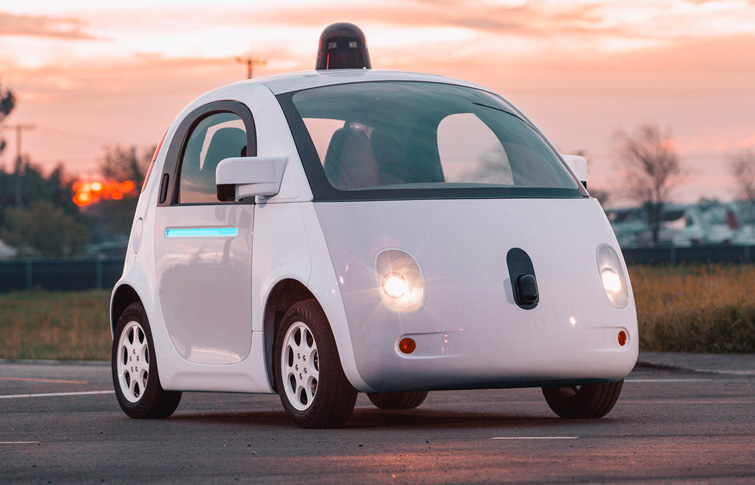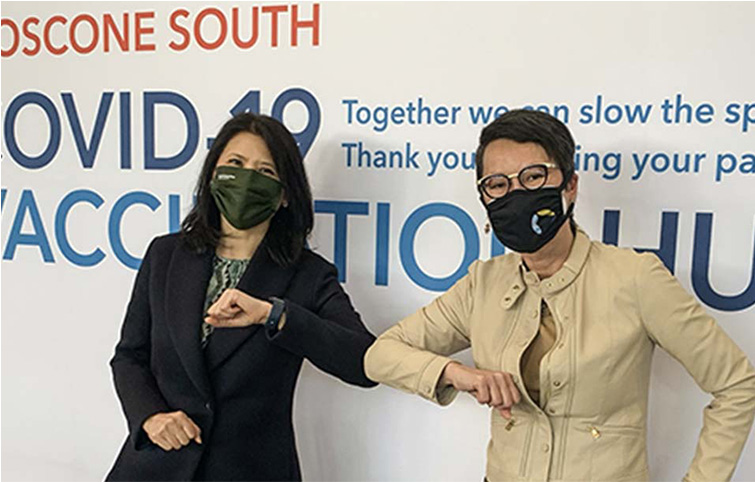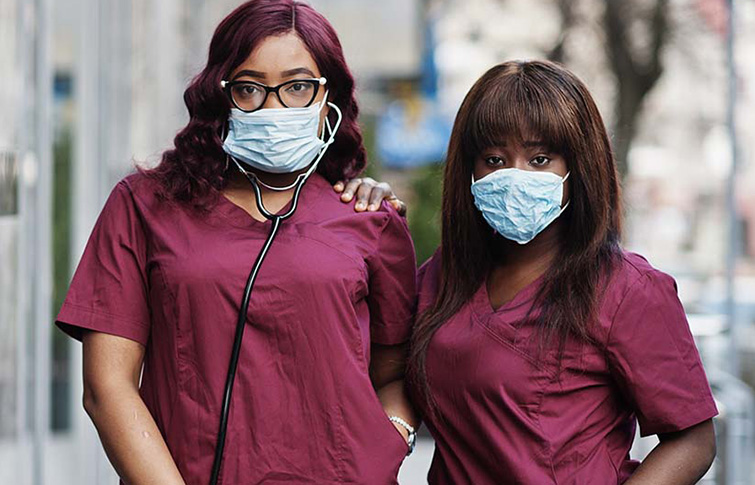Look to Futuro Health for
best practices in workforce development
Case Study: Future of Care
DESIGN-FORESIGHT CHALLENGE EXAMINES HOW THE FUTURE OF MOBILITY CAN INTERSECT WITH THE FUTURE OF CARE
Nissan, Valley Breeze Consulting, and Futuro Health joined forces to concept potential uses of autonomous vehicles for more equitable delivery of care in the home.
Challenge:
Nissan’s R&D team in Japan sought to explore newer applications of mobility concepts within the healthcare and wellness space. Nissan already had completed a broader project with Valley Breeze Consulting (VBC) and saw Futuro Health as the ideal healthcare thought partner. Futuro Health, applying a best practice in workforce development, regularly examines how innovation leaders use technology differently to gain foresight on how workflows and skillsets are likely to shift
Solution:
- Nissan, Stanford, VBC and Futuro Health formed a core team comprised of experts with skillsets in automotive engineering, healthcare, design-foresight thinking, and project management.
- While funded by Nissan, the project brought together partners from different industries, which created the foundation for out-of-the-box thinking.
- The team met regularly across global times zones every two weeks over a six- month period.
- Futuro Health identified critical publications, studies, and observations and highlighted trends associated with the future of care that could benefit from different mobility and workforce solutions.
- Validation interviews were conducted with a range of experts, including those in healthcare, materials design and more.
- Guided by design-foresight practices, the team iterated its common understanding of the opportunity space.
- As the project unfolded, Nissan gained novel design insights to inform its approach to automotive concepts. A proprietary comprehensive report was authored for Nissan that outlined scenarios for concept modelling.
- Thanks to the project, Futuro Health gained foresight into how the paramedic role will change as acute care shifts into the home. Learning this enables Futuro Health to seek changes to curriculum ahead of the labor market need.

“We are exploring new areas of mobility research and are interested in the intersections with future healthcare. We enjoyed our collaboration with Futuro Health. They brought forth the healthcare context of what was happening in the United States — especially the shift of care into the home and the inequities realized during the pandemic. This got us to think of alternative uses for vehicles in the provision of care.”
Takashi Fukushige
Research Engineer and Manager, Research Planning Department, Nissan Motor Corporation
“The project focuses on the future mobility in healthcare. We explore from today to the 2030/2035 time range. Futuro Health provides us the insights into the medical care infrastructure, i.e., talent training deployment, policy, and more. We try to anticipate the physician’s and patient’s behavioral changes that seems to be fully dependent on how we build up the human infrastructure. The insights are unique to us who are unfamiliar with that perspective.”
Kimihiko Iwamura
Managing Director, Valley Breeze Consulting
Case Study: Telehealth
CLINICS LACKED SKILLS FOR TRANSITION TO TELEHEALTH SERVICES DURING THE PANDEMIC
Futuro Health partners with University of Delaware to skill-up the clinical, IT, and quality assurance staff of Federally Qualified Health Clinics (FQHCs) -- with a 92% training completion rate.
Challenge:
The first few COVID-19 surges prompted shelter-in-place requirements and meant that patients could no longer walk into public health clinics. This resulted in lost revenues to FQHCs, many of whom were already struggling with limited resources. These clinics recognized the need to cut over to telehealth services but doing so challenged the skillsets of their staff.
Solution:
- Futuro Health heard the workforce concerns of FQHC leaders and sourced a fully online, self-paced curriculum to equip clinic staff responsible for making the operational transition to telehealth.
- The University of Delaware had a proven program but had limited capacity. Futuro Health consulted with the university on how to expand seats and arranged for lower tuition prices along with a streamlined batch enrollment process.
- Futuro Health joined the California Primary Care Association to invite the public health clinics to send staff – advising them to send teams of individuals in leadership roles spanning the clinical, IT and the quality indicator functions – who would most benefit from the training.
- Over 227 individuals enrolled in the 15-week program across clinics throughout the state.
- Futuro Health identified the employer need in May and began taking enrollees two months later, with the first cohort starting and finishing in the fall of 2020. The second cohort followed the next spring.
- Futuro Health navigators supported students with coaching, leading to a completion rate of 92%. Not only were the employers appreciative but the University of Delaware was thrilled with the high completion rate and the batched enrollment attributable to Futuro Health.

“Telehealth patient care is here to stay even when the pandemic recedes. We appreciate the training resources being brought to our organization by Futuro Health for the future of care.”
Jane Garcia
CEO of La Clínica de La Raza, Inc., a community clinic in Oakland
“Telehealth allows health centers to expand and enhance access to critically needed services for California’s most vulnerable. We are excited to partner with Futuro Health in expanding and improving telehealth in California.”
Louise McCarthy
President and CEO, Community Clinic Association of Los Angeles County
“Futuro Health brought us an entirely new audience of students to our online Advanced Telehealth Coordinator certificate. We were pleased with the students’ high level of course engagement and completion rate.”
Dr. George Irvine
Associate Vice Provost for Professional and Continuing Studies University of Delaware
“Taking a course like this, you walk away with such a wealth of knowledge. It was so well done.”
Wendy B.
Lead Coordinator, Chapa-De Indian Health
Case Study: Clinical Training
NEXT GENERATION OF HEALTHCARE STUDENTS UNABLE TO EARN THEIR CLINICAL HOURS
Futuro Health leveraged the mass vaccination campaign to give allied health and nursing students their direct patient care experience.
Challenge:
Upon FDA approval of vaccines for the nation, health systems mobilized to facilitate mass vaccination. Kaiser Permanente, Adventist Health, the California Medical Association, Dignity Health and Futuro Health joined forces. The larger organizations redirected their staff and temporary agencies to provision workers for the sites which were to operate seven days a week and 12 hours per day. Futuro Health proposed using the Moscone Center mass vaccination site to enable nearby nursing and allied health students to gain direct patient care experience, as required for their licensure. During the pandemic, most employers shut down their clinical rotations – impeding students from meeting their training requirements. With Futuro Health’s win-win proposal, the organizers gained no-cost workers to meet the large staffing demand generated by the mass vaccination efforts while students gained their clinical hours.
Solution:
- Early on, Futuro Health commissioned a study identifying solutions to the clinical bottleneck impeding the next generation of healthcare workers.
- When the mass vaccination efforts arose, Futuro Health proposed to Kaiser Permanente, which initiated the consortium, an effort to mobilize nearby nursing and allied health students to staff the sites.
- Futuro Health conducted an outreach campaign to all nearby colleges within commuting distance and worked through the liability and waivers.
- Futuro Health readied a webpage and activated a sign-up tool for prospective qualified volunteers. In addition, we hired and readied a Site Manager team to supervise selection, onboarding, scheduling and supervision of workers across two sets of shifts per day. This team formed workflows to meet the strict compliance requirements established by the organizers.
- A member of the Futuro Health leadership team served as central command and attended consortium coordination meetings, which were frequent given the intense timeline of the entire mass vaccination operation.
- Futuro Health staffed and oversaw the Moscone vaccination center Pod L, which is the accessibility pod, with two shifts a day every day from 7am-7pm for two months. Futuro Health started the planning in mid-January and completed the project by April.
- The Futuro Health pod, alongside our higher education partners, delivered 387 workers who covered 4,350 shifts, worked 25,000 hours, earned 7,500 clinical hours collectively, and played a role in administering 677,100 vaccines when combined with the consortium’s efforts in Cal Poly, Stockton and Bakersfield.

“This unique, collaborative endeavor shows how we can provide patients with high-quality care while helping to move students toward fulfilling, in-demand career.”
Tom Hanenburg
Senior Vice President, Kaiser Permanente Hospital System Operations
“The opportunity provided for the students at Futuro Health was amazing. The students were able to become part of a huge public health initiative while gaining direct clinical hours administering vaccines to the local community in San Francisco. The student body at College of San Mateo is incredibly diverse and many of the students are fluent in other languages. The students were able to utilize their language skills putting patients at ease addressing their concerns related to the COVID vaccine while providing quality care”
Julie Withrington RN, BSN, CCRN, NNEB
Professor of Nursing, College of San Mateo
“This clinical experience has made me feel like I have finally entered the clinical learning environment where I begin to experience the way multiple disciplines work together to care for the patients. I like to say thank you for giving us this great learning opportunity.”
Marizelle Ochoa
Student, Unitek College
“Participating in the Futuro Health/Kaiser Moscone mass vaccination clinic has been one of the greatest privileges of my career. Getting to be a part of history, in such a monumental way, has truly been a wonderful opportunity for me. In addition to making history, I was able to work with the nursing students of my alma mater as well as several other nursing students. It was an honor to give back and help train the next generation of nurses to come out and join us on the frontlines. It is something I will always treasure and be so proud to have been a part of.”
Cheyenne Vennarucci, RN
Volunteer at Futuro Health’s Pod at the Moscone Center
Case Study: Allied Health Training
LARGE-SCALE SHORTAGE IN HEALTH WORKFORCE CALLED FOR SOLUTION WITH DIVERSITY • EQUITY • INCLUSION FOCUS
Kaiser Permanente and SEIU-UHW partner to grow the next generation of allied health workers through Futuro Health –- resulting in diverse adults trained for in-demand careers.
Challenge:
Allied health occupations comprise an estimated 60% of the healthcare workforce nationwide. California’s projected demand is approximately 500,000 new workers by 2024. Kaiser Permanente (a large healthcare system) and SEIU-UHW (a union representing an est. 100,000 hospital worker members) sought to address this shortage and grow the next generation of healthcare workers. The path forward was unknown.
Solution:
- Kaiser Permanente and SEIU-UHW seeded a commitment of $130 million to form Futuro Health.
- Futuro Health’s leadership team immediately sought to design a workforce development solution with attention to scale, equity and agility – and successfully navigated the demands and expectations of both Kaiser Permanente and SEIU-UHW.
- Futuro Health solicited input from prospective students, employers, education providers, and other stakeholders and devised a unique strategy. The organization would create an ecosystem of higher education and student support partners to structure a better student journey from enrollment to career. Then scale.
- Futuro Health secured better tuition pricing by streamlining the student recruiting and onboarding processes for education providers. Education providers updated curriculum, made instructional delivery adult-friendly and created more start dates at the request of Futuro Health.
- Futuro Health engaged SEIU-UHW members in an Opportunity Campaign to scout and recruit applicants from diverse communities. Futuro Health went a step further and created data tools to give each recruiter feedback on the quality of their referrals.
- Two years after inception, over 5,000 diverse adults enrolled in an education program through Futuro Health. They earned in-demand healthcare credentials during a time when the nation’s higher education enrollment dropped significantly, and the healthcare workforce shortage became more acute due to the pandemic.
- Futuro Health students are 80% ethnically and racially diverse, 73% female, an average age of 30, and 51% are bilingual.

“We are pleased to bring equity into healthcare through Futuro Health and to be able to offer local communities the opportunity to train for in-demand careers in healthcare.” Janet Liang
Executive Vice President, Group President, and Chief Operating Officer, Kaiser Permanente
“Futuro Health has exceeded our expectations.”
Dave Regan
President, SEIU-UHW
“Workforce shortages of this magnitude are structural in nature. We designed an ecosystem to deliver on adult-friendly student journeys and that offered the promise of scale, equity and agility.”
Van Ton-Quinlivan
CEO, Futuro Health
